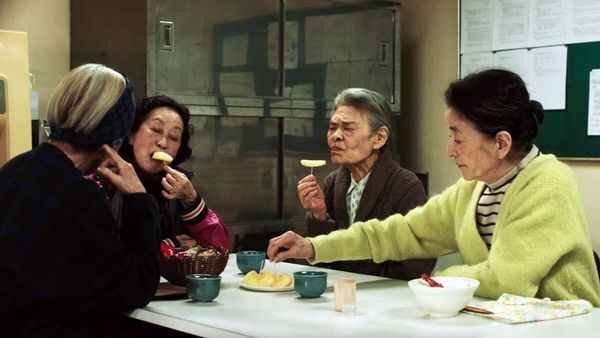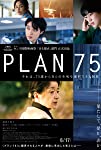Eye For Film >> Movies >> Plan 75 (2022) Film Review
Plan 75
Reviewed by: Jennie Kermode

In European countries, increasing concerns are being raised about the fact that populations are getting older, but that’s nothing compared with Japan. More than 29% of its citizens are over the age of 60, the birth rate is 1.34 children per woman (2.3 is the number needed to keep a population static), and a longstanding reluctance to allow much immigration means that help isn’t going to come from outside. How is a government to manage a situation like that? This darkly satirical slice of futurism imagines a proposed solution: Plan 75.
Set just a few years into the future, this film imagines a country in which everybody is expected to keep working until the end of their days. Elderly people face discrimination in housing, with soaring rents, and there has also been an increasing number of hate crimes committed against them. Plan 75, whose adverts screen in the streets and in public spaces like cancer wards, references the long, proud history of Japanese people’s self sacrifice for the sake of their country, and introduces a right to assisted dying for everyone over 75. Choosing to die in this way entitles an individual to a payment which might be spent on a personal treat or passed on to children or grandchildren, plus there’s a guarantee of help in tidying up their affairs and dealing with their possessions. On the screen, we see pictures of smiling elderly people thanking nurses, all in soft focus, accompanied by soothing music.

Whilst most viewers will feel instinctive horror at this proposal, it’s not difficult to understand how it could be attractive to someone living in strained circumstances. The issues addressed will be familiar to members of the disabled community, within which there are ongoing discussions around the right to die. It’s of great importance to some people dealing with untreatable pain or similar difficulties, but three big questions arise. Firstly, shouldn’t governments do more – where it’s possible – to improve the lives of people who might otherwise choose death? Secondly, how can we make sure that people who would really rather stay alive don’t feel forced into it? And thirdly, does it contribute to society devaluing the lives of people in that group?
Here, the government is explicitly encouraging people to take up the option of a comfortable premature death. Hiromu (Hayato Isomura) is a sales agent, under pressure to meet quotas, who feels positive about the whole thing until his own uncle Yukio (Takao Taka) enters the programme. The two haven’t spent time together for many years, but as Plan 75 brings them together, during its mandatory waiting period. Hiromu develops a hitherto unknown fondness for the old man and begins to panic about what lies in store.
We also spend time with Michi (Chieko Baisha), a 78 year old woman on whom the day to day burdens of life are taking an increasing toll. After signing up, she’s assigned to Filipina nurse Maria (Stefanie Arianne) for daily 15 minute sessions of counselling, and it’s only through these, reflecting on her past and the arranged marriage which blighted her youth, that she begins to realise that she is only now really learning how to live. As the deadline gets closer, she and Maria form a bond, something which wasn’t supposed to happen, and both begin to question what they’re doing.
The film is full of sharp little observations, made in passing, which tell us about this society and the experience of people living it. In the park, Yukio encounters those benches which are angled to keep homeless people from sleeping on them, and which are consequently very difficult for many elderly or disabled people to use. Later, Michi, on the phone with Maria, switches hands to cope with the weight of the receiver. The process of living is not easy, but frequently this is by design, or due to the absence of very basic help.
What really makes this film powerful is the way in which it engages with a hot button political issue without losing sight of the human stories behind that. Director Chie Hayakawa has been open about the horror she feels at the idea of such a programme, yet here she recognises that some people are genuinely ready to die, and that it might be the right thing for them. For others, it is very clearly not. The biggest issues here are coercion and the lack of dignity underlying a process which is all surface gloss (there are broader criticisms of modern society at work here too). Something essentially human is missing.
It’s no surprise that the film ends with a move away from the sophisticated artificiality of the city, out into wilder, more primitive spaces. In the very final shot, a character steps out of frame. No matter how hard we might try to systematise and classify the processes of life, some things are simply unknowable.
Plan 75 screened as part of the 2023 Glasgow Film Festival.
Reviewed on: 09 Mar 2023
















